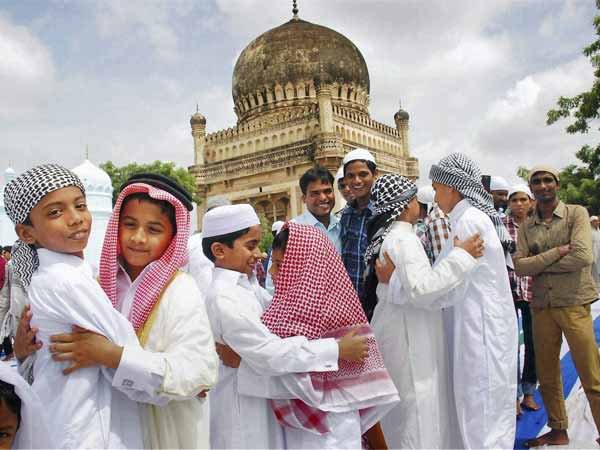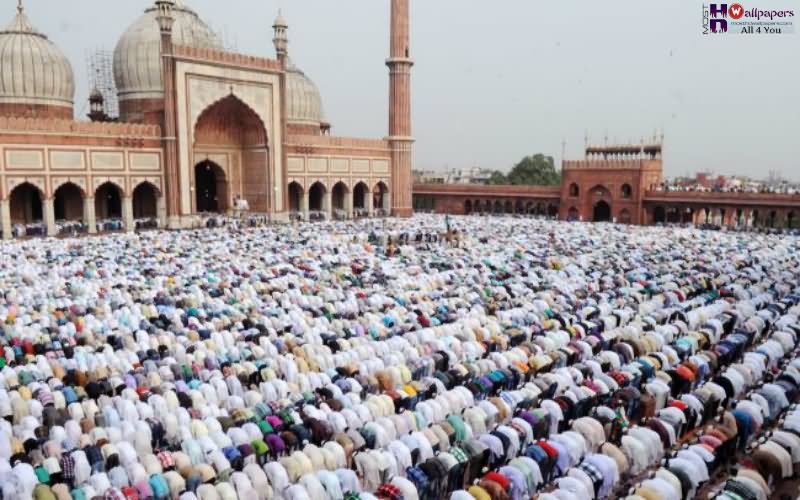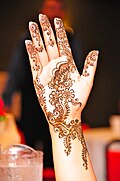Eid al-Fitr is an important religious holiday celebrated by Muslims worldwide that marks the end of Ramadan, the Islamic holy month of fasting (sawm). The religious Eidis the first and only day in the month of Shawwal during which Muslims are not permitted to fast. The holiday celebrates the conclusion of the 29 or 30 days of dawn-to-sunset fasting during the entire month of Ramadan. The day of Eid, therefore, falls on the first day of the month of Shawwal. The date for the start of any lunar Hijri month varies based on the observation of new moon by local religious authorities, so the exact day of celebration varies by locality.
Muslims believe that they are commanded by God, as mentioned in the Quran, to continue their fast until the last day of Ramadan and pay the Zakat and fitra before offering the Eid prayer. Traditionally, it is the day (beginning at sunset) of the first sighting of the crescent moon shortly after sunset. If the moon is not observed immediately after the 29th day of the previous lunar month (either because clouds block its view or because the western sky is still too bright when the moon sets), then it is the following day.Eid al-Fitr is celebrated for one, two or three days. Common greetings during this holiday are the Arabic greeting ‘Eid Mubārak ("Blessed Eid") or ‘Eid Sa‘īd ("Happy Eid"). In addition, many countries have their own greetings in the local language – in Turkey, for example, a typical saying might be Bayramınız kutlu olsun or "May your Bayram – Eid – be blessed." Muslims are also encouraged on this day to forgive and forget any differences with others or animosities that may have occurred during the year.
Typically, practising Muslims wake up early in the morning—always before sunrise—offer Salatul Fajr (the pre-sunrise prayer), and in keeping with the traditions of the Prophet Muhammad clean their teeth with a toothbrush, take a shower before prayers, put on new clothes (or the best available), and apply perfume.
It is forbidden to fast on the Day of Eid. It is customary to acknowledge this with a small sweet breakfast, preferably of date (fruit), before attending a special Eid prayer (known as salaat).
As an obligatory act of charity, money is paid to the poor and the needy (Arabic: Zakat-ul-fitr) before performing the ‘Eid prayer.The following list contains some general rituals:
- To show happiness
- To give as much to charity as possible
- To pray Fajr in the local Masjid
- To go early for Eid salaat
- To read the takbirat in an open field
- To go to the Eid prayer on foot
- While at the open field/praying area, same rules apply as the mosque, nl. do not speak one word other than words that remember Allah or any Islamic terms during the Imam's lecture as well as before and after Eid Salaat. You can speak once you've left the Masjid, or mosque or any other place you were praying.
- Say Eid Mubarak to other Muslims-
- Muslims recite the following incantation in a low voice while going to the Eid prayer: Allāhu Akbar, Allāhu Akbar, Allāhu Akbar. Lā ilāha illà l-Lāh wal-Lāhu akbar, Allahu akbar walil-Lāhi l-ḥamd. Recitation ceases when they get to the place of Eid or once the Imam commences activities.[11]
- Muslims are recommended to use separate routes to and from the prayer grounds.[12]
- Women are encouraged to join Salat of Eid
- No fasting on Eid al-Fitr
- There is no Adhan and/or Iqamah for Eid prayer
Eid prayer and eidgah
The Eid prayer is performed in congregation in open areas like fields, community centres, etc. or at mosques. No call to prayer is given for this Eid prayer, and it consists of only two units of prayer with an additional six incantations. The Eid prayer is followed by the sermon and then a supplication asking for Allah's forgiveness, mercy, peace and blessings for all living beings across the world. The sermon also instructs Muslims as to the performance of rituals of Eid, such as the zakat. Listening to the sermon at Eid is not required and is optional, a Sunnah i.e. while the sermon is being delivered. After the prayers, Muslims visit their relatives, friends and acquaintances or hold large communal celebrations in homes, community centres or rented halls.

The eid feast

Eid -ul-fitar celebrations


Prayers at mosque

Eid-ul-fitur is celebrated in many countries across the world . some of them are saudi arabia , turky,indonesia etc.
INDIA
Celebrations in India and the rest of the Indian subcontinent share many similarities with regional variations, because a large part of the Indian subcontinent was ruled as one nation during the days of the Mughal Empire and British Raj. The night before Eid is called Chaand Raat, which means, "Night of the Moon". Muslims in these countries will often visit bazaars and shopping malls with their families for Eid shopping. Women, especially younger girls, often apply the traditional Mehndi, or henna, on their hands and feet and wear colourful bangles.
The traditional Eid greeting is Eid Mubarak, and it is frequently followed by a formal embrace. Gifts are frequently given—new clothes are part of the tradition—and it is also common for children to be given small sums of money (Eidi) by their elders. It is common for children to offer salam to parents and adult relatives.
After the Eid prayers, it is common for some families to visit graveyards and pray for the salvation of departed family members. It is also common to visit neighbours, family members, friends and to get together to share sweets, snacks and special meals including some special dishes that are prepared specifically on Eid. Special celebratory dishes in India, Pakistan, and Bangladesh include Lachcha/লাচ্চা or sivayyan/শিমাই, a dish of fine, toasted sweet vermicelli noodles with milk and dried fruit (see Sheer khurma).[45]
On Eid day before prayers, people distribute a charity locally known as fitra. Many people also avail themselves of this opportunity to distribute zakat, an Islamic obligatory alms tax of 2.5% of one's annual savings, to the needy. Zakat is often distributed in the form of food and new clothes.
In India, there are many popular places for Muslims to congregate to perform Eid prayers at this time include the Jama Masjid in Delhi, Mecca Masjid in Hyderabad, Aishbagh Idgah in Lucknow, Red Road and Nakhoda Masjid in Kolkata, Taj-ul Masjid in Bhopal, Jama Mosque in Mumbai, Hajratbal Mosque in Kashmir. Muslims turn out in the thousands, as there is a lot of excitement surrounding the celebration of this festival. It is common for some Hindus to visit their Muslim friends and neighbours on Eid to convey their greetings.
Eid celebrations in India
Here I would be able to discuss only few countries.
Bangladesh
Eid al-Fitr is commonly known in Bangladesh as 'Romjaner Eid' and is observed over a three-day public holiday in Bangladesh. Educational institutions, banks and corporate offices usually remain closed for almost a week during this time. Bangladeshis observe the holiday by performing the obligatory Eid prayers on the morning of Eid, hugging each other and exchanging greetings, giving alms and gifts, and visiting friends, neighbours and relatives. Popular customs also include ladies decorating one's hands with henna, people dressing up in new clothes and having a good meal with family members, relatives and friends. The morning of Eid begins with men and woman taking a bath, wear the newest clothes and head for Eid Prayer then people exchange hugs and head home where a large banquet of food would be prepared. The most common foods during Eid is Pilau rice, Chicken Korma, Roast, Rezala, Kebabs, Prawn Malai curry and Chili chicken, although many other dishes are also prepared. However the most extravagant arrays of dishes are dessert which consist of Rasmalai, Rasgulla, Sandesh, Firni, a popular bengali dish call Paesh, Mishti Doi (Dahi) and Faluda amongst many others. In Bangladesh family and friends visit each others houses over the course of the 3 days and 3 or 4 houses are visited a day. During the days of Eid children receive lots of money by relatives and family friends. For Bangladeshis Eid Al Fitr is the most awaited public holiday.
Pakistan
In Pakistan on the day of Eid al-Fitr, people wear new clothes to get ready for Eid prayer. People are supposed to give obligatory charity on behalf of each of their family member to the needy or poor before Eid day or at least before Eid prayer. This will allow everybody to share the joy of Eid and not feel depressed. There is three days' national holiday for Eid celebration, while festivities and greetings tradition usually continues for the whole month. There is also a tradition that has developed in the recent past of people sending Eid greeting cards to distant family members, relatives and friends.
For Eid prayer, people gather at large open areas like sports grounds, parks or large open area. After Eid Salat people meet and greet each other with traditional hug of friendship and the greeting "Eid Mubarak". Before going home people give charity to needy and the poor, to further make it possible to have everybody be able to enjoy the day. On their way home, people buy sweets, gas balloons for kids, and gifts for the family. At home family members enjoy special Eid breakfast with various types of sweets and desserts, including traditional dessert sheer khurma, which is made of vermicelli, milk, butter, dry fruits and dates, etc.
Eid is mainly enjoyed by the kids, as they mostly receive money in cash called "Eidi" as gift by every elder in the family and relatives when they visit their places. On Eid day kids are allowed to spend their gift money (Eidi) as they want. Media also cover Eid festivities all day and air various special programmes on TV for all age groups.
Games and outdoor amusements such as fairground rides are enjoyed all day. People visit their elders relatives first then others and friends all day and share the joy of the day. Some go to parks, seaside, rivers or lake fronts to enjoy and relax. Family get together in the evening to enjoy Eid dinner, and plan how to celebrate second and third day of Eid.




No comments:
Post a Comment